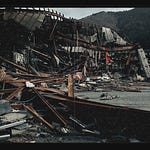I have been intrigued by the concept of the Overton Window for a while now. Initially because of its profound implications for social policy. The framework offers us a way to understand how cultural shifts happen, how ideas once considered radical can become accepted norms, and how policy change occurs. As I delved deeper, I realized that this concept has an equally significant application in an area of crucial importance—disaster policy and creating a culture of preparedness.
So, let’s explore the framework known as the Overton Window and how it can be utilized to foster more robust and effective approaches to managing disasters.
For those unfamiliar, the Overton Window is a term that has been applied to a concept that public policy thinker Joseph Overton used to describe the ideas tolerated in public discourse. In essence, it's a conceptual spectrum between 'unthinkable' and 'popular,' marking out the ideas that are politically feasible at any given time.
When we speak of disaster policy, we encounter various views influenced by social, political, and economic factors. However, the effectiveness of any disaster policy is significantly constrained by what is considered politically and socially acceptable. Herein lies the power and applicability of the Overton Window.
The Status Quo
Let's start by examining the current Overton Window regarding disaster policy. Most importantly, immediate response measures, such as deploying emergency services and relief funds, are widely accepted. These are within the 'safe' zone of the Overton Window.
However, more proactive, long-term strategies—such as infrastructural improvements to withstand natural hazards or allocating funds to predictive modeling of disasters—are often viewed as 'radical' or 'impractical.' These initiatives are outside the Overton Window, so they struggle to gain political or public support.
Shifting the Window
So, how do we shift the Overton Window in the context of disaster policy? How do we make the 'radical' become 'sensible,' and the 'sensible' become 'popular'?
First, awareness and education are critical. Disasters aren't just acts of God or unfortunate coincidences; they result from human choices—where we build, how we build, and how we prepare. We can start changing perceptions through academic research, public discourse, and, most importantly, the education system.
Second, we must leverage the media effectively. The media has an unparalleled ability to influence public opinion, for better or worse. By presenting well-reasoned, factual accounts of proactive disaster policies' benefits, we can shift the window of what's acceptable.
Case Studies
Now, let's consider some case studies to illustrate these principles. After Hurricane Katrina, there was a noticeable shift in the Overton Window surrounding disaster preparedness. The horrific aftermath and inadequacies in the response efforts were highly publicized. As a result, there was a brief but significant window during which the public and politicians alike were more willing to consider proactive disaster policies.
Countries like Japan, which experience frequent natural disasters, have managed to shift the Overton Window to include comprehensive educational programs about disaster preparedness from an early age. Earthquake and tsunami drills are as common as school fire drills, making them a 'sensible' part of the policy spectrum.
Creating a Culture of Preparedness
So, what does this mean for creating a culture of preparedness? It means that such a culture only forms after a period of time. We must first expand the Overton Window to make proactive, long-term strategies politically and socially palatable. Creating a culture of preparedness requires us to normalize the discourse around subjects such as risk mitigation, infrastructure resilience, and emergency planning.
By expanding the Overton Window, we can make proactive approaches to disaster policy not just 'thinkable' but 'popular' and 'policy-implementable.' This transition will take a lot of work, but it's necessary for our communities' long-term safety and resilience.
The need for effective policy is evident as we confront a future that promises more frequent and severe disasters. By understanding and applying the Overton Window concept, we can work towards creating a culture of preparedness that will save lives and protect our communities' economic and social fabric.












